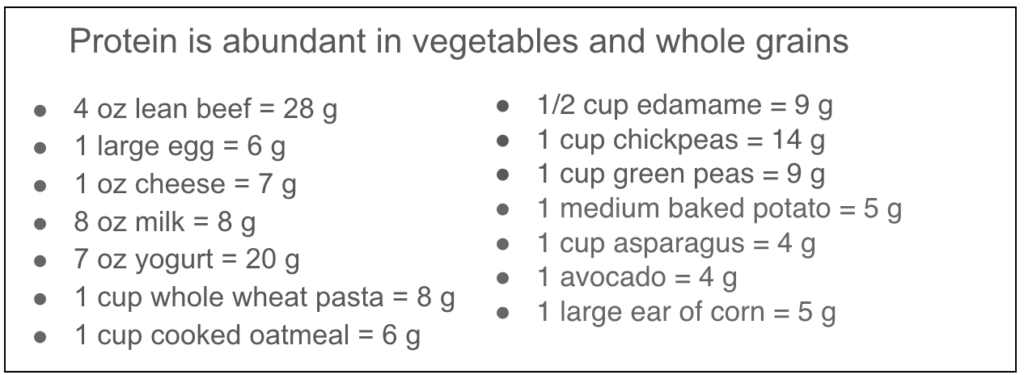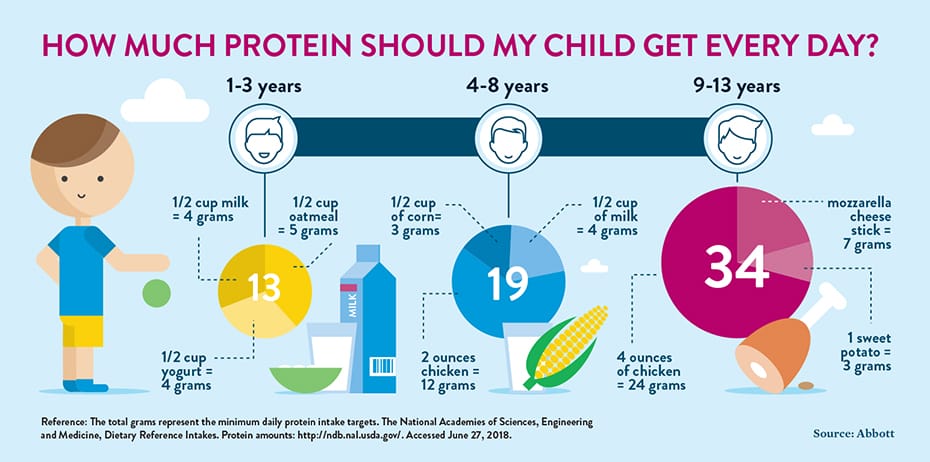Protein – How much is enough? Can you have too much?
Research has clearly shown that eating too much fat causes weight gain due to excess calorie intake. Carbohydrates (sigh!), this poor nutrient category sure has taken its share of abuse. Everything from no-carb to low-carb to only-brown-carbs has circulated through the media. The truth is, both children and adults over-consume carbohydrates, which, like fats, can lead to weight gain. But dear, old protein, particularly lean protein, is there a “can’t have too much of a good thing” disclaimer on protein as well???
Yep, it’s true. Protein is not spared in the foods-you-should-eat-in-moderation discussion. Protein is required to build, maintain, and repair the tissues in our body. However, like carbohydrates and fats, protein contains calories, and those calories we do not need will be stored as fat.

Protein Requirements – How much do we need?
Kids require approximately 1-1.5 grams of protein for every TWO pounds of body weight, or more precisely, 1-gram protein per kg (1kg=2.2lbs). Thus, a 40-lb (18.2 kg) child needs approximately 18 grams protein per day! “That’s not as much as I thought, you say?” Let’s see how quickly protein adds up!

Sample Menu (suggested for a 4-year old child)
Breakfast: 6 oz fat-free yogurt, ½ cup berries, ½ cup dry cereal, 4 oz skim milk
Snack: ½ apple
Lunch: 2 oz turkey breast, ½ cup baby tomatoes, 10 whole grain pretzels, 5 strawberries, 4 oz skim milk
Snack: ½ cup edamame
Dinner: 4 bites chicken breast, ½ cup pasta, ½ cup broccoli, 4 oz skim milk
TOTAL (drumroll please!): 76 g protein
(Menu provides: 931 calories, 10 g fat, 18 g fiber, 1376 mg Calcium, 15 mg Iron)
This example actually provides sufficient protein for an average adult woman! Seem unrealistic? Look how it breaks down. Milk and other dairy products, provide a large quantity of protein, approximately 1g/oz. Additionally, whole grains provide a considerable amount of protein, particularly those enriched with bean/legume flours. Then, of course, lean meats are touted for their protein content, typically provide about 7 g protein per 1 oz portion.
Protein and Athletic Performance
Protein has been shown to increase muscle mass when combined with heavy weight training. As compared to a diet consisting of 0.8 gram protein/kg body weight, research from the Journal of the American College of Nutrition found that a protein intake of 1.6-1.8 g/kg/day, when combined with weight training, will further enhance muscle development. Most importantly, there is little evidence that very high protein (greater than 2g/kg body weight per day) is beneficial. Further, supplementation with powders, drinks, or other diet aids is not required nor recommended, and it is possible to obtain sufficient protein through a balanced diet.
Can you have too much protein?
Protein breaks down to amino acids, and produces waste products that are filtered through the kidneys. With healthy functioning kidneys, this additional waste is excreted. Excess protein consumption only makes the kidneys work harder, rather than damage the kidneys, as may be assumed. High protein load does, however, lead to increased water loss, and can lead to dehydration. Thus, maintaining adequate fluid intake is essential.
Bottom line: You really can have too much of a good thing. Keep a good balance of fats, protein and carbohydrates, for a healthy, growing body. Have specific questions about you or your child’s protein requirements? Book an Appointment with one of our FEED dietitians and discuss your child’s nutrition.